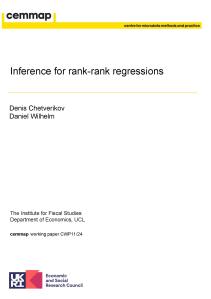A growing literature on inference in difference-in-differences (DiD) designs has been pessimistic about obtaining hypothesis tests of the correct size, particularly with few groups. We provide Monte Carlo evidence for four points: (i) it is possible to obtain tests of the correct size even with few groups, and in many settings very straightforward methods will achieve this; (ii) the main problem in DiD designs with grouped errors is instead low power to detect real effects; (iii) feasible GLS estimation combined with robust inference can increase power considerably whilst maintaining correct test size – again, even with few groups, and (iv) using OLS with robust inference can lead to a perverse relationship between power and panel length.
Authors

Mike Brewer

Research Fellow University of Michigan
Tom is a Research Fellow at IFS, a Research Professor for the Institute for Social Research at the University of Michigan.

Deputy Director
Robert is a Deputy Director. His work focuses on primarily on the labour market, income and wealth inequality, and the design of the welfare system.
Journal article details
- DOI
- 10.1515/jem-2017-0005
- Publisher
- De Gruyter
- JEL
- C12; C13; C21
- Issue
- October 2017
Suggested citation
M, Brewer and T, Crossley and R, Joyce. (2017). 'Inference with difference-in-differences revisited' (2017)
More from IFS
Understand this issue

Gender norms, violence and adolescent girls’ trajectories: Evidence from India
24 October 2022

What are the challenges in getting debt on a falling path?
28 June 2024

What is the two-child limit in benefits?
27 June 2024
Policy analysis

IFS Deputy Director Carl Emmerson appointed to the UK Statistics Authority Methodological Assurance Review Panel
14 April 2023

ABC of SV: Limited Information Likelihood Inference in Stochastic Volatility Jump-Diffusion Models
We develop novel methods for estimation and filtering of continuous-time models with stochastic volatility and jumps using so-called Approximate Bayesian Compu- tation which build likelihoods based on limited information.
12 August 2014

Is there really an NHS productivity crisis?
17 November 2023
Academic research

Inference for rank-rank regressions
28 May 2024

Sample composition and representativeness on Understanding Society
2 February 2024

The impact of labour demand shocks when occupational labour supplies are heterogeneous
28 June 2024